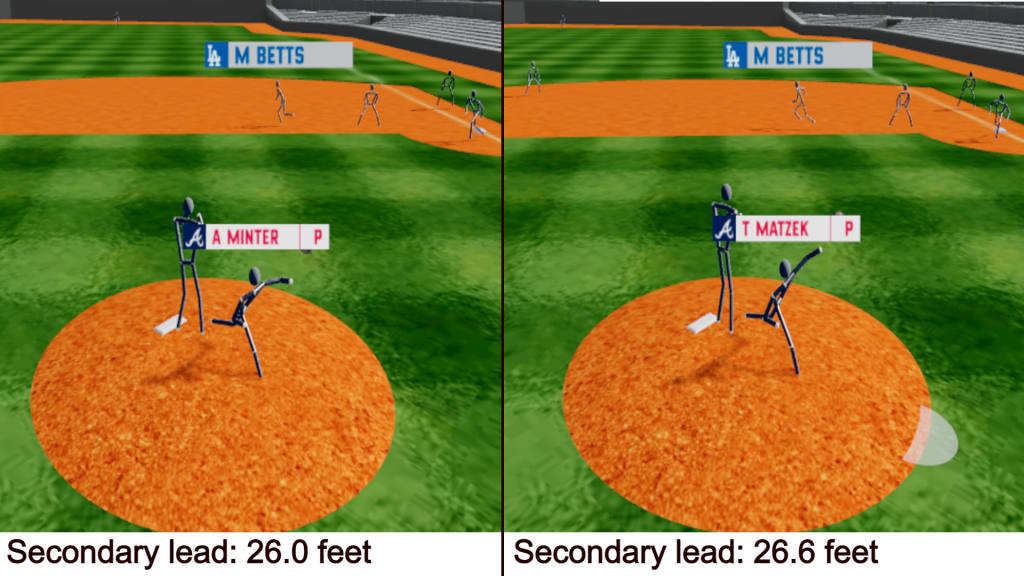The stolen base is dying … except it's not. In the postseason, it's rising from the ashes.
In the 2021 regular season, there were 2,213 stolen bases, the fewest in a full season in 30 years. In the 2021 postseason, there have been 45 stolen bases, the sixth most in a single postseason. With a few more in the World Series, 2021 could become one of only four postseasons all-time with 50 or more total stolen bases.
Most SB in a single postseason
1995: 59
1999: 56
2008: 51
1992: 49
2015: 46
2021: 45 (through WS Game 5)
But the real key is this: On the flip side of those 45 stolen bases, only four runners have been caught stealing. The 91.8% success rate on stolen-base attempts would set a record for a single postseason. And it's over 15 percentage points higher than the 75.7% success rate during the regular season.
Postseasons with highest SB%
Min. 10 SB attempts
2021: 91.8% (45-for-49)
2019: 87.2% (34-for-39)
1975: 85.2% (23-for-27)
1989: 83.3% (35-for-42)
2007: 80.6% (29-for-36)
So how are the baserunners doing it? We can use the Statcast data and FieldVision's 3D tracking to take a closer look. Statcast tracks every base stealer's lead distance and sprint speed, and with FieldVision, we can see how that becomes a successful steal. So let's break down some of the stolen bases throughout the playoffs.
Here's how baserunners are dominating the postseason.
Pure speed in the NL Wild Card Game
In a tight, low-scoring, winner-take-all game, the Dodgers and Cardinals both used aggressive baserunning to try to create runs, especially in the late innings. There were five stolen bases in the game, three by St. Louis and two by L.A., and those steals were the product of pure speed.
Major League average sprint speed -- that's how fast a player gets up to on a competitive run -- is 27 feet per second. Here are the sprint speeds for the five steals in the Wild Card Game.
Tommy Edman (STL), Top 1: 29.0 ft/sec
Tyler O'Neill (STL), Top 7: 28.7 ft/sec
Cody Bellinger (LAD), Bottom 7: 28.7 ft/sec
Tommy Edman (STL), Top 9: 28.5 ft/sec
Cody Bellinger (LAD), Bottom 9: 28.6 ft/sec
Those are all much faster than average. Which isn't too surprising, because Edman, O'Neill and Bellinger are all fast runners. But the point is, they stole those bases because of their speed, not because they were getting huge jumps (the only one who had a big lead was O'Neill).
That speed made a difference. Edman manufactured the first run of the game -- after his steal, he tagged up to third on a foul flyout, then scored on a wild pitch. And Bellinger set up the Dodgers' walk-off win by stealing second with two outs in the ninth inning.
Arozarena's straight steal of home
The straight steal of home might be the most exciting play in baseball, and it's a huge rarity. So Randy Arozarena pulling one off in the Rays' win in Game 1 of the ALDS was one of the coolest highlights of the postseason.
Arozarena took advantage of Red Sox left-hander Josh Taylor's exaggerated stretch motion, taking off for home with Taylor's back turned, reaching a 28.2 ft/sec sprint speed and diving in ahead of the tag.
His secondary lead on the steal: 65.5 feet. That means he was over two thirds of the way down the line by the time Taylor stepped off the rubber and threw home.
Look how close Arozarena is to home by the time Taylor makes the throw. Add that to how fast he's moving down the line, and there's no way you catch him.
Houston picks on Grandal in the ALDS clincher
The Astros routed the White Sox, 10-1, in the clinching Game 4 of the ALDS, and went 4-for-4 on steals. Catcher Yasmani Grandal got off a throw on only one of the attempts.
• Jose Altuve went on the first move from lefty Carlos Rodón, who never even looked over to first, and with Altuve's big jump (24.5-foot secondary lead) and wheels (29.4 ft/sec sprint speed), there was no chance for Grandal.
• Kyle Tucker stole second and third on back-to-back pitches. Grandal seemed thrown off by Chas McCormick leaning over the plate on the first one and had to scoop a slider out of the dirt on the second one, and he didn't throw either time.
• Michael Brantley, not a fast runner, stole second with Craig Kimbrel going slow to the plate (1.53-second release time). Grandal wasn't able to make a strong throw after picking another slider (76.8 mph arm strength).
The Dodgers run wild with huge jumps in the NLCS
Los Angeles went a perfect 16-for-16 stealing bases this postseason, and 11-for-11 in the NLCS alone. The Braves couldn't control the running game at all against the Dodgers, who ran at will.
Part of that was their team speed, led by players like Trea Turner -- who in Game 1 outwaited a slo-mo delivery from Max Fried, who took over two full seconds to deliver the ball as he tried to deceive the runner, and burst to second with an elite 30.2 ft/sec sprint speed (anything 30 or faster is elite speed).
But the key factor was the Dodgers' jumps.
Avg. secondary lead on SB attempts of 2nd this season: 21.5 feet
Avg. secondary lead on successful SB of 2nd: 22.2 feet
Dodgers' avg. secondary lead on SB attempts in the NLCS (11-for-11): 23.3 feet
The Dodgers averaged a lead nearly two feet bigger than the average for stolen-base attempts, and over a foot bigger than the average lead on successful steals.
On seven of their 11 steals, Dodger baserunners had a lead of at least 23 feet. Betts in particular showed why he's an expert baserunner -- he stole two bases in Game 2, for example, getting a secondary lead of 26-plus feet on both. Those are huge jumps.

When you're getting those jumps, and have the speed the Dodgers do (they averaged 28.0 ft/sec on their steals against the Braves), and are stealing off a catcher like Travis d'Arnaud, who doesn't throw out a lot of runners ... keep running. Los Angeles did.
Albies kicks off the NLCS and World Series
The Dodgers ran the most in the NLCS, but the Braves won the pennant, and Albies' clutch steal in Game 1 sent them on their way.
In a tie game in the bottom of the ninth inning, he got a good jump on Blake Treinen (24.4-foot secondary lead) and used his speed (28.6 ft/sec sprint speed) to beat a good throw from Will Smith. The very next pitch, Austin Riley singled Albies home for the walk-off win.
Albies also started the World Series with a steal, taking off on first move from left-hander Framber Valdez in the top of the first inning of Game 1. Even though Albies didn't get the biggest jump (only a 19.3-foot secondary lead), he reached a top-tier sprint speed of 29.2 ft/sec, which forced catcher Martín Maldonado to try to rush a throw, and he couldn't get a clean grip on the ball. After the steal, Riley drove in Albies again.
The Astros put the pressure on the Braves
The Astros, like the Dodgers, are running often and successfully. They're 12-for-12 stealing bases this postseason, including 5-for-5 in the World Series.
In fact, that makes this year's Houston and Los Angeles clubs two of only three teams to be perfect on stolen-base attempts in a single postseason while attempting 10 or more.
Teams with the best SB% in a single postseason
Min. 10 SB attempts
2021 Dodgers: 100% (16-for-16)
2021 Astros: 100% (12-for-12)
1989 Blue Jays: 100% (11-for-11)
2002 Angels: 92.9% (13-for-14)
1981 Dodgers: 92.9% (13-for-14)
In the World Series, the Astros have pushed the envelope against the Braves. They're not stealing bases with the ease the Dodgers did against Atlanta, but they've been rewarded for using their speed aggressively.
• In Game 2, Kyle Tucker and Yuli Gurriel pulled off the only double steal of the postseason, with Tucker just beating d'Arnaud's throw to third. Tucker's lead (27.1 feet, which is shorter than even the average for caught stealings at third this season, 27.5 feet) and sprint speed (27.8 ft/sec) weren't exceptional, but he got in there with a good slide.
• In Games 3 and 4, Jose Siri and Tucker forced throwing errors by d'Arnaud with their speed. Siri stole second in Game 3 with a 29.5 ft/sec sprint speed, and Tucker in Game 4 with a 28.4 ft/sec sprint speed. Both got only small leads -- 17.4 feet for Siri, 16.9 feet for Tucker -- and a good throw could have gotten either of them, but since d'Arnaud had to get rid of the ball quickly, he short-hopped the throws into center field and Siri and Tucker got their steals.
• In Game 5, Jose Altuve stole second straight through a pickoff. Altuve took off on first move from left-hander Drew Smyly, who saw him and was able to react by stepping off and throwing over to first. But his pickoff throw was off-line and Freddie Freeman had to lunge to catch it, giving Altuve just enough time to beat Freeman's throw to second. Altuve never hesitated once he committed to the steal, reaching a near-elite sprint speed of 29.7 ft/sec, which let his aggressive baserunning pay off even when the Braves had him picked off.
We've seen it all this postseason when it comes to stealing bases: runners stealing with raw speed, runners stealing on pitchers who are slow to the plate or ignoring them, runners stealing on catchers without the arm to shut down the run game, runners stealing on bang-bang plays where they've just gotten the edge.
They're picking the right spots, the big spots, to go for the steal: 16 of the 45 stolen bases this postseason, over a third, have come with two strikes; 16 of the 45 have come while the game is within a run; 22 of the 45, nearly half, have come with two outs.
Postseason base-stealers are running fast (on over half of the stolen bases in the playoffs, the runner's sprint speed has been 28 ft/sec or faster), and they're running smart (on over half of the steals of second, the runner has gotten a big lead of over 22 feet), and that makes it worth it to run. That's why what we've barely seen at all is them getting caught.
